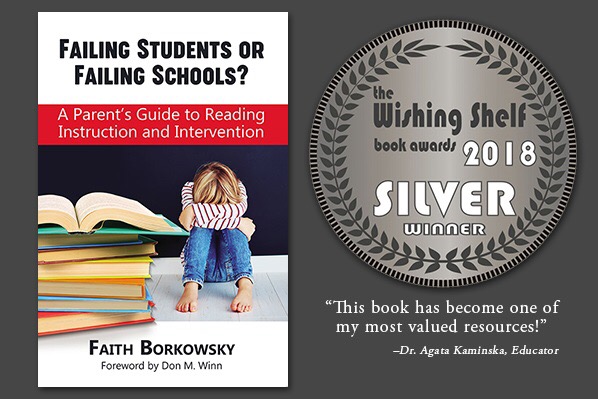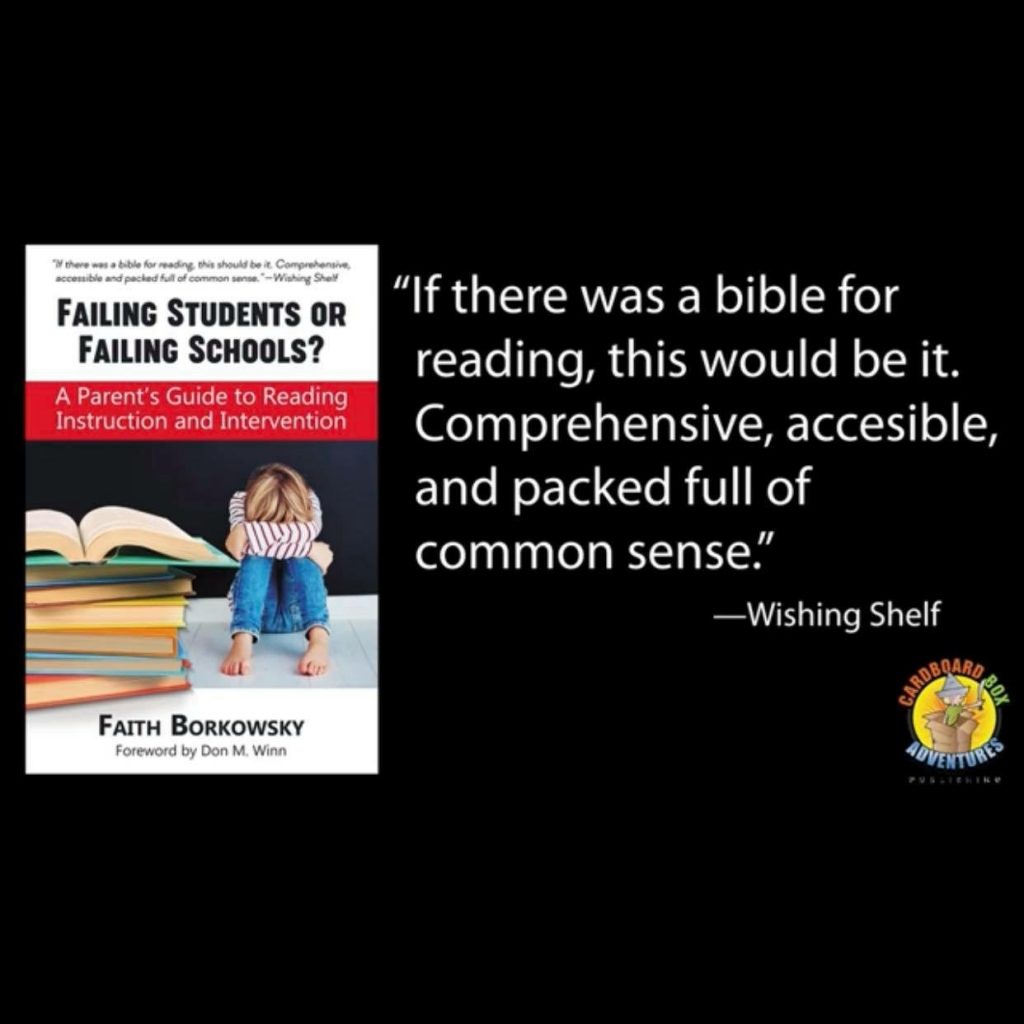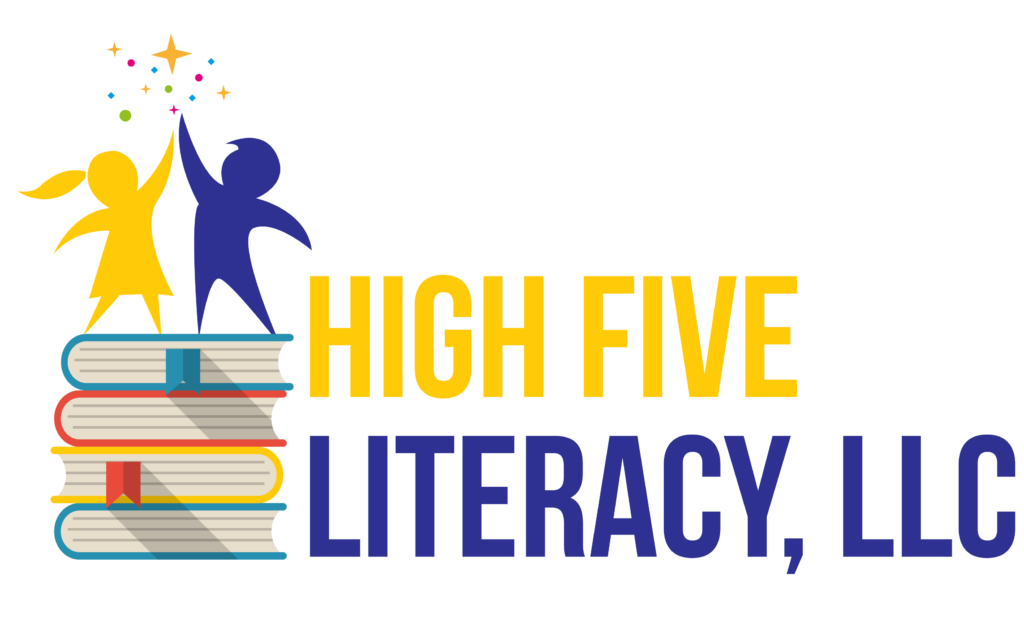I am always honored to be invited to present at Special Education Parent Teacher Association (SEPTA) meetings and share information with an interested audience. Recently, I was asked to talk about the reading process, dyslexia, and why children continue to struggle to read. The meeting was well attended with a nice mix of parents, teachers, and administrators. I was particularly impressed that the superintendent was present and even had a copy of my book, Failing Students or Failing Schools? A Parent’s Guide to Reading Instruction and Intervention, which he had clearly read, as evidenced by dozens of color-coded Post-it notes sticking out of the book. I said to myself, “This is a district that really wants to make a difference, learn about dyslexia, and work with families to improve reading instruction for all children.”

After two and a half hours of presenting and then responding to audience inquiries, the crowd began to dissipate, and I was ready to leave. The superintendent approached me at that point, wanting to speak “privately.” He had a principal by his side because, he stated, she had a degree in literacy. Ironically, that was not necessary because neither one asked me about literacy. Although the superintendent stated, “I read your book in earnest and had positive takeaways,” the two administrators proceeded to interrogate me for over 40 minutes about WHY I wrote my book. Yes, that’s all they wanted to know. They were displeased with what they called “loaded” language and “inflammatory” anecdotes about teachers, administrators, school districts, and data manipulation. They suggested that I could and should have written a “how-to” guide on reading instruction without including real-life stories and anecdotes from my experience.
It was disappointing that there were no questions about content, instruction, or intervention. It was disappointing that there were no questions about curriculum, program implementation, books, or materials. It was disappointing that there were no questions about teacher training, dyslexia, screening, benchmarks, or evaluations.
I’m not sure what they thought they would accomplish. Were they expecting me to apologize or explain myself? Unpublish my book? It was as if, by informing parents of what I had experienced behind school walls, I had broken some secret code among educators.
Perhaps they were fearful of parents being able to ask more informed questions about the district’s recent adoption of the Teachers College Reading and Writing Project (TCRWP), the purported gold standard in literacy education. This, notwithstanding that TCRWP’s Guided Reading curriculum does not align well with the science of reading. After eschewing phonics instruction for years, and in an obvious response to the growing support for greater adhesion to scientifically based reading instruction, TCRWP recently added what alleges to be a phonics unit of study to its “balanced” literacy program. With great fanfare, press releases, and what I view as a rambling and disjointed interview by the program’s publisher, Heinemann, TCRWP’S Lucy Calkins declared, “The work we’ve done in phonics is a game changer.”
Unfortunately, it is not a game changer.
Calkins had to know TCRWP would be under attack given the mounting evidence supporting the use of explicit, systematic phonics, and she had to appease the critics. She stated, “And now all of our standards are for phonics, and reading, and writing. So, in New York State in the new iteration of common core, they’re recommending 20 minutes a day for phonics, and that’s what our phonics program is.”
I find it enlightening how, in the quoted language, she differentiates between phonics and reading as if they are mutually exclusive. Throughout the interview, she perpetuates the myth that Structured Literacy does not work toward “transfer” of foundational skills to fluency and higher-level comprehension.
Because she sounds impressive and authoritative, many will continue to dogmatically subscribe to her narrative. The truth is, however, that she makes very little sense and reveals a fundamental lack of knowledge and practical experience working with struggling readers. TCRWP’s addition of the phonics unit of study is nothing more than a band-aid to meet minimum requirements and placate naysayers.
Despite the sales pitch, informed parents will hopefully now know what a Structured Literacy approach means, and that the additional phonics component is not a game changer.
Perhaps the two administrators were concerned that if parents read my book they might band together like the parents in the highly regarded Tredyffrin-Easttown School District of Pennsylvania (Everyone Reads T/E). Those parents, frustrated by their district’s lack of responsiveness to their requests to meet the needs of all students, felt compelled to write an open letter to the board. Previously, they had communicated with me about the resistance they have faced in trying to implement a reading framework that works for ALL children. For a long time, professionals in affluent areas have been able to hide behind their districts’ reputations. The T/E Everyone Reads group is, among other things, encouraging parents to look at student growth scores which reveal that, despite lofty numbers overall, the T/E School District does not do a very good job of helping low performers make progress.
I suppose, as the administrators suggested, I could have written a book entitled, “A Parent’s Guide to Reading Instruction and Intervention,” as they would have preferred. Yes, I could have, but nobody would have read it. Those books have been written before, and they collect dust on bookshelves.I suppose I could have written an academic book and included lots of research citations, but experts like Mark Seidenberg already write such books for professionals who are interested in literacy instruction.

My book is meant for the person who doesn’t know how reading should be taught and wonders why the school can’t seem to help. It is written for parents who have felt ignored, shamed, and accused of not reading enough to their own children. It is written for the parents who have a child in supplemental services for years without noticeable improvement. I have heard from so many parents who tell me that they finally feel heard by someone who has worked behind school walls and has intimate knowledge. These parents feel validated for the first time seeing what they thought, but could not put into words, expressed in plain English by an educator.
It is written for teachers who are reflective about their teaching practices and realize that a large number of children are not reading adequately due to poor instruction. It is written for the teachers who privately message me, lamenting that they are not permitted to do the job, and thanking me for my honesty and boldness.
It is written for administrators who really want to do the best for the families in their communities but might not have the background in literacy to know what to do, or recognize that their background in literacy is too limited. They bravely look in the mirror and know that my experience is their experience, too. The book resonates with people because it is filled with a passionate plea to put aside ideology and learn about evidence-based practices. It is not written in “edubabble” or highfalutin language; it is meant to be truly read. If the book is causing a stir, then perhaps the dialogue is necessary and long overdue.
The last I heard, the school district acknowledged a problem and is endeavoring to address students’ needs.
I consider this a positive step in the right direction.
Faith Borkowsky is the Founder of High Five Literacy and Academic Coaching with over thirty years of experience as a classroom teacher, reading/learning specialist, regional literacy coach, administrator, and tutor. Ms. Borkowsky is Orton-Gillingham trained and is a Wilson Certified Dyslexia Practitioner listed on the International Dyslexia Association’s Provider Directory. She provides professional development for teachers and school districts, as well as parent workshops, presentations, and private consultations.

7 Comments. Leave new
Bravo! The only thing you left out is that this problem is world-wide, as teachers push the buttons on computers, hoping that they will do their work for them.
Yes!! I love and admire your courage! As Joyce said, Bravo!! We need your bravery and voice. Don’t listen to the naysayers holding onto their edubabble. Shame on them for not listening!!
Inflammatory? These people only represent themselves, what a sorry commentary
Hey Faith! Kudos to you on this published book! I would love to read it! I am still teaching in Brooklyn at PS 206 and amazingly… will have completed 22 years in July. I hope you and your family are well. Irv and I are well as is our family.
cuz nina cohen
Wow! Mind blowing! Obviously they were on the defense… They should have used your knowledge and picked your brain rather than attacked you you.
SMH
Faith, these words (that you wrote above) are SO important and cut to the heart of the problem – “It was disappointing that there were no questions about content, instruction, or intervention. It was disappointing that there were no questions about curriculum, program implementation, books, or materials. It was disappointing that there were no questions about teacher training, dyslexia, screening, benchmarks, or evaluations.”
Many of those in leadership have so VERY much to learn themselves to be able to better help their students learn… Your book is excellent, Faith. Bravo! (For those looking at reading it, I wrote a review on Amazon.)
Can a Leopard change is spots? Is there any sign of regret or repentance for promoting student failure on an industrial scale.